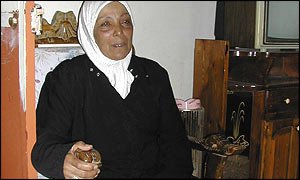WEST BANK MASSACRE; Hebron Mourners Predict Bloodshed
By JOEL GREENBERG,
Published: March 2, 1994
Sitting in long, silent rows, the grieving men listened somberly as the words of Sheik Taysir Bayud al-Tamimi, the chief Muslim judge of Hebron, echoed through the bare meeting hall today.
"This is a crime of historic proportions," he told about 100 relatives and friends of the Muslim worshipers gunned down by a Jewish settler on Friday at a mosque in the Cave of the Patriarchs shrine here, known to Muslims as al-Haram al-Ibrahimi.
"The Crusaders killed 70,000 Muslims, but it wasn't as terrible as this," Sheik Tamimi. "There has never been such a crime. We must fight to liberate our country. The peace negotiations must stop." More Violence Predicted
The judge spoke for many in Hebron who, beyond their shock at the the massacre on Friday, were horrified that the carnage had occurred in a mosque, inside what they consider one of the holiest places of Islam. They predicted that the killing would open a new chapter of violence in the history of their city.
The hall where the sheik spoke, usually used for family celebrations of the prominent Natsheh clan, today was converted into a house of mourning for family members to receive condolence calls. Despite an army-imposed curfew, a steady stream of visitors arrived.
Anger radiated from the walls, which were covered with handmade signs calling for revenge.
"We will kill every last Jew until not a single one of them remains on the face of our land," one sign said.
"God bless those who are martyred resisting the Jews," said another.
The slogans reflected the rage that has welled up here since Friday, uniting mainstream and militant Palestinians in the kind of declarations of undying enmity usually made only by the militants. Some Preparing to Act
While it is unclear whether the fighting words will turn into deeds, there were signs that some Palestinians were preparing to act.
Young men passed out leaflets of the militant Islamic group Hamas declaring "a state of emergency" and urging Palestinian armed groups to "make speedy military plans to strike at Zionist targets, the occupation troops and the settler herds."
To relatives of the dead and those who came to comfort them, the mass killing on Friday was resounding proof that Jews and Arabs could never live together in peace in this ancient city. About 400 Jewish settlers are wedged in among 70,000 Palestinians in Hebron, and 5,000 more Jews live in the adjacent settlement of Qiryat Arba.
"This is the beginning of a holy war," said Jibrin Natsheh, 48, whose older brother, Jamil, was killed in the massacre. "This is not the first killing, and it won't be the last. As long as there are settlements, this will continue. We will never get along with the Jews."
Mr. Natsheh said his brother had been a frequent target of assaults by settlers because he had been the prayer caller at the Cave of the Patriarchs mosque, chanting the summons to worship five times a day over loudspeakers. In the attack on Friday, while he was in a row of tightly packed worshipers, "he was hit by 10 bullets, from the abdomen to his head," Mr. Natsheh said. "His face was unrecognizable." Incident Before the Massacre
Some men said they had sensed that trouble was brewing on the night before the massacre, during an altercation at the cave with Jewish settlers praying just outside the mosque.
Versions of what happened that night differ widely.
Settlers say they were the victims, taunted by Arabs who called for a slaughter of Jews. But Arab men said today that the settlers were the provocateurs. They defiled the mosque, the men said, by hurling in shoes that worshipers had taken off outside as a sign of respect. The Arabs said the settlers had also blocked mosque exits during their own prayers, forcing the Muslims to wait three hours before they could leave. The Arabs said that when they protested, the settlers warned ominously: "Wait and see what happens tomorrow."
Abdel Halik Abdel Mutalib, who lost a nephew in the massacre, said the killing was a result of the accord reached in September between Israel and the Palestine Liberation Organization. The secretary of the Islamic Benevolent Society in Hebron, he returned in December from Lebanon, where he was deported at the end of 1992 with some 400 Palestinians accused of being Islamic militants after a series of fatal attacks on Israelis. 'This Has Led to the Crime'
"The accord allows Israel to keep its settlements in the occupied territories and to defend them, and this has led to the crime," Mr. Abdel Mutalib said. "At any time a settler can say he's crazy, open fire in Hebron and kill more people."
Khalil Natsheh, another member of the large clan, who studied for six years in the United States, said the massacre had left him feeling vulnerable. "I feel no different sleeping in my house than in a tent," he said. "I might be attacked at any moment by settlers. They did it in a mosque, and they can do in next time in the marketplace or in a hospital."
Although his imprisoned brother was freed today as part of an Israeli release of 596 Palestinians, Mr. Natsheh said the massacre had left him unmoved by the good-will gesture.
"My brother had two weeks left in his term," he said. "Am I happy now? I'm not happy. It makes no difference to me after this tragedy."
http://query.nytimes.com/gst/fullpa...1A35750C0A962958260&sec=&spon=&pagewanted=all
who has the history of terrorism and fabrications and obstruction of Justice?



















